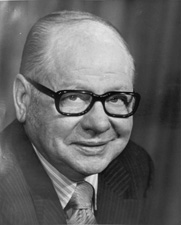Carl T. Curtis
| Carl Curtis | |
|---|---|
 |
|
|
United States Senator from Nebraska |
|
|
In office January 1, 1955 – January 3, 1979 |
|
| Preceded by | Hazel Abel |
| Succeeded by | J. James Exon |
| Member of the U.S. House of Representatives from Nebraska's 1st district |
|
|
In office January 3, 1943 – December 31, 1954 |
|
| Preceded by | Oren S. Copeland |
| Succeeded by | Phillip Hart Weaver |
| Member of the U.S. House of Representatives from Nebraska's 4th district |
|
|
In office January 3, 1939 – January 3, 1943 |
|
| Preceded by | Charles Gustav Binderup |
| Succeeded by | Arthur L. Miller |
| Personal details | |
| Born |
March 15, 1905 Minden, Nebraska |
| Died | January 24, 2000 (aged 94) Lincoln, Nebraska |
| Political party | Republican |
| Alma mater | Nebraska Wesleyan University |
Carl Thomas Curtis (March 15, 1905 – January 24, 2000) was an American politician from the U.S. state of Nebraska. He served as a Republican in the United States House of Representatives (1939–1954) and later the United States Senate (1955–1979).
Curtis was born on his family's farm in Kearney County, Nebraska, near the county seat of Minden. He attended public schools and later attended Nebraska Wesleyan University, where he was a member of Theta Chi. He studied law on his own and passed the bar exam. He began practicing law in Kearney County and served as the county attorney from 1931 to 1934.
Curtis was elected to the House of Representatives in 1938 on an anti-Franklin D. Roosevelt and New Deal platform. He served in the House from 1939 until 1954, being reelected every two years. Curtis ran for the Senate from Nebraska in 1954 and won the election, then after incumbent Hazel Abel resigned, he was appointed on January 1, 1955 to the U.S. Senate, getting a 2-day jump on seniority. He was reelected three more times to six-year terms, serving from 1955 to 1979. He voted for the Civil Rights Act of 1964. Curtis was loyal to the Republican Party, particularly supporting its anti-communist stances and fiscal conservatism, which included opposition to social programs such as the New Deal and Lyndon B. Johnson's Great Society.
A close ally of both Barry Goldwater and Richard Nixon, Curtis served as floor leader during the 1964 Republican National Convention, when Goldwater won the nomination.
...
Wikipedia
